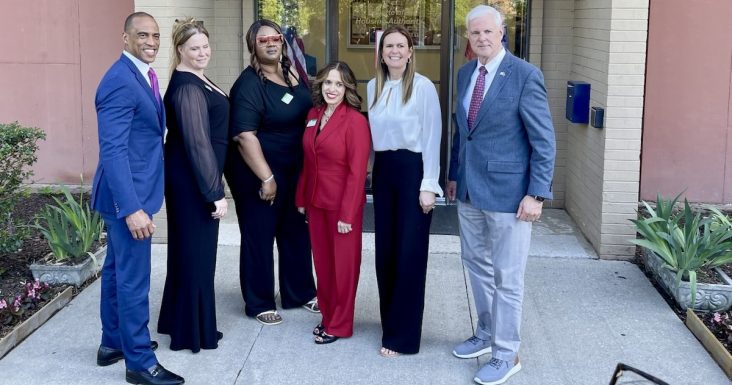U.S. Rep. Womack, Gov. Sanders, HUD Secretary Turner tour Third District to address housing issues
by April 22, 2025 5:54 pm 1,273 views

U.S. Rep. Steve Womack, R-Rogers, the chairman of the Transportation, Housing and Urban Development (THUD) Subcommittee of the House Appropriations Committee, hosted U.S. Department of Housing and Urban Development (HUD) Secretary Scott Turner in his Congressional District Tuesday (April 22).
Gov. Sarah Sanders joined the two officials for a portion of the tour.
The district tour was an opportunity for Womack to highlight needs in his district and to provide more details to Turner as the two work to address affordable housing, homelessness, and workforce training issues.
The day’s tour took officials to Bentonville High School for a discussion on affordable housing and urban development. They also were provided a presentation of McAuley Place, a newly announced 160-unit affordable housing development that will house teachers, staff, and other residents of the Bentonville school district.
In Springdale, the entourage took a tour of downtown’s Opportunity Zone projects, which Turner worked on when he was with the White House in the first Trump administration. Opportunity Zones are economically distressed areas that can receive preferential tax treatment for developments and businesses.
Towards the end of the day, the group visited Hillcrest Towers, a 120-unit complex managed by the Fayetteville Housing Authority. It offers accessible, efficiency apartments for 55+ and disabled tenants.
Womack said that in the current operational budget about $4.5 billion was added to address housing needs, primarily to keep up with inflationary pressures. He said the big challenge will be addressing added housing needs with the pressure to reduce federal spending.
“We are putting our money where our mouth is, but this is one small step right now that was a continuing resolution that runs up through the 30th of September. The challenge right now will be for Congress to write the FY 26 bills, which is not going to be an easy task. It’s one that we can do and we should do, it’s our job, but there will be some challenges with it,” Womack said.
“Notably, the fact that the amount of money that’s set aside for discretionary spending continues to shrink over time because of the impact on the entitlement programs and the fact that that side of the balance sheet is growing exponentially. We will always have a challenge and there will be emerging needs. We really don’t know what those needs will be until we have a chance to sit down and look at the discretionary budget writ large. Remember, more than half of that discretionary budget is in national security, and so we’ve got to be careful not to compromise ourselves from a security standpoint,” he added.
Turner noted that his role as HUD Secretary requires a balance of serving several constituencies, but he declared that he hoped his work would reduce the needs for affordable housing.
“Our job and my job as the leader at HUD is really to take inventory of the programs that we have at HUD and I think that’s a responsible position to take as the leader,” Turner said. “My goal, my heart, and for everyone who’s here, listen, my heart is not to grow the amount of people on subsidies. My heart is not to grow the amount of people that need government help. My heart is to get people off of subsidies and live a life of self-sustainability.
He noted some observations of the day of nonprofits and faith-based institutions that were working in partnership to address regional needs.
“I believe that’s a way that we can attack this situation and attack the problem that we do have to help people in workforce training to help people in skills training in the trades and so on and so forth. That’s a overall holistic view from my standpoint when it comes from HUD and being a servant leader there and seeing the people of America live lives and see the trajectory change from where they are now. There are those who need government subsidies right now, but our heart is to see that less and less and use the federal expenditures for other programs going forward,” he added.
Gov. Sanders, who worked with Turner in the first Trump White House, also acknowledged that affordable housing is a critical issue for the region and state. She said while the state has limited resources, a close relationship with the federal government was crucial for addressing needs.
She also cautioned that reducing the federal debt had to remain a priority. The Congress and its efforts to cut federal spending could curtail addressing all of the housing needs that exist.
“One of the big things is working very closely with the federal government,” Sanders said. “A lot of the funding that comes for these programs comes from the federal side, but they’re right to take a look at what are the most effective programs? Are we spending money efficiently and effectively? There are cases certainly where we are, but there are a lot of places and rooms for improvement.
“When we’re $36 trillion in debt, we have to do a better job of spending the money we have in a better and more effective way. I think working very closely with both our federal delegation as well as the administration is going to be a big part in the state’s role.”
